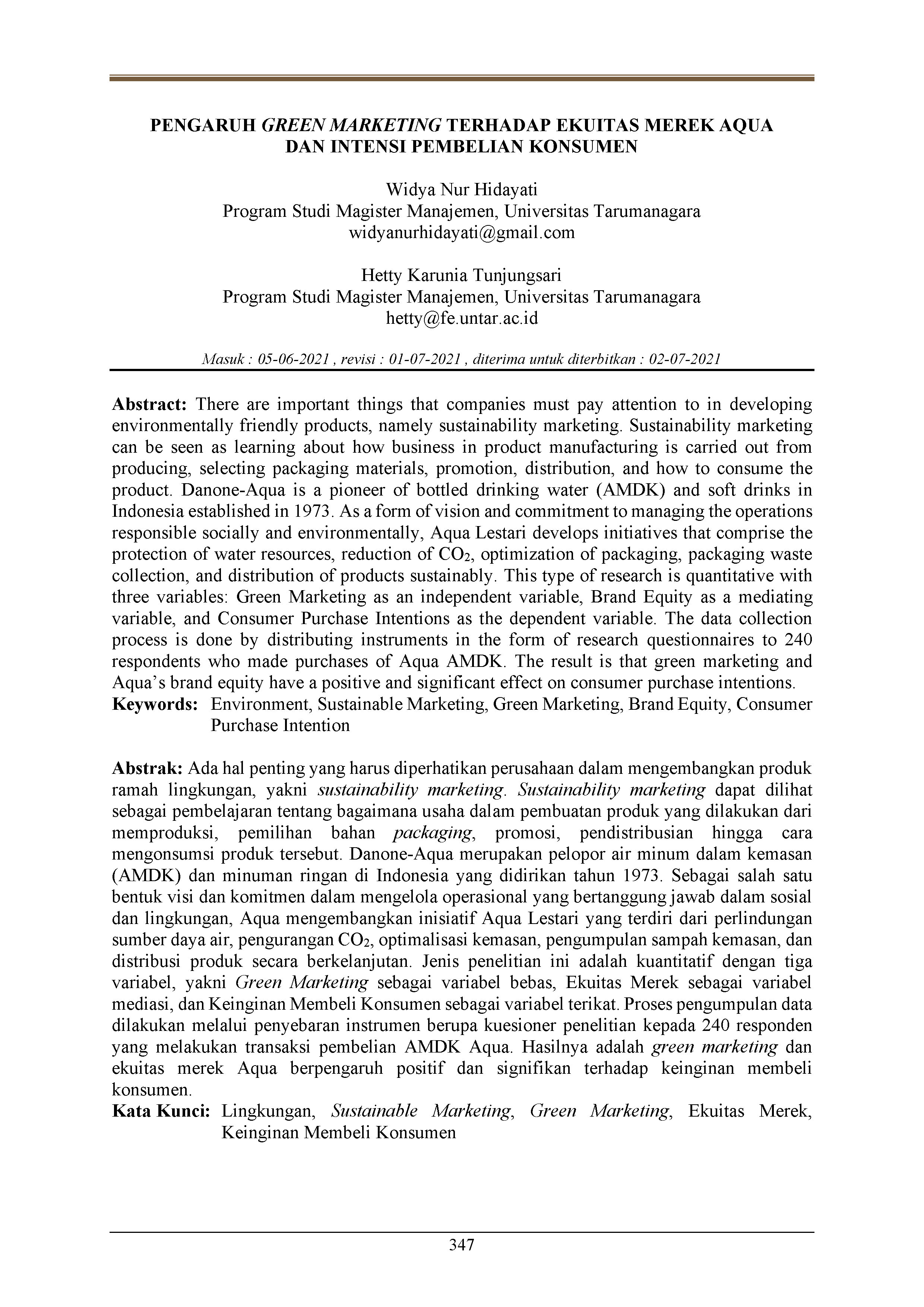Pengaruh Green Marketing terhadap Ekuitas Merek Aqua dan Intensi Pembelian Konsumen
Main Article Content
Abstract
There are important things that companies must pay attention to in developing environmentally friendly products, namely sustainability marketing. Sustainability marketing can be seen as learning about how business in product manufacturing is carried out from producing, selecting packaging materials, promotion, distribution, and how to consume the product. Danone-Aqua is a pioneer of bottled drinking water (AMDK) and soft drinks in Indonesia established in 1973. As a form of vision and commitment to managing the operations responsible socially and environmentally, Aqua Lestari develops initiatives that comprise the protection of water resources, reduction of CO2, optimization of packaging, packaging waste collection, and distribution of products sustainably. This type of research is quantitative with three variables: Green Marketing as an independent variable, Brand Equity as a mediating variable, and Consumer Purchase Intentions as the dependent variable. The data collection process is done by distributing instruments in the form of research questionnaires to 240 respondents who made purchases of Aqua AMDK. The result is that green marketing and Aqua’s brand equity have a positive and significant effect on consumer purchase intentions.
Ada hal penting yang harus diperhatikan perusahaan dalam mengembangkan produk ramah lingkungan, yakni sustainability marketing. Sustainability marketing dapat dilihat sebagai pembelajaran tentang bagaimana usaha dalam pembuatan produk yang dilakukan dari memproduksi, pemilihan bahan packaging, promosi, pendistribusian hingga cara mengonsumsi produk tersebut. Danone-Aqua merupakan pelopor air minum dalam kemasan (AMDK) dan minuman ringan di Indonesia yang didirikan tahun 1973. Sebagai salah satu bentuk visi dan komitmen dalam mengelola operasional yang bertanggung jawab dalam sosial dan lingkungan, Aqua mengembangkan inisiatif Aqua Lestari yang terdiri dari perlindungan sumber daya air, pengurangan CO2, optimalisasi kemasan, pengumpulan sampah kemasan, dan distribusi produk secara berkelanjutan. Jenis penelitian ini adalah kuantitatif dengan tiga variabel, yakni Green Marketing sebagai variabel bebas, Ekuitas Merek sebagai variabel mediasi, dan Keinginan Membeli Konsumen sebagai variabel terikat. Proses pengumpulan data dilakukan melalui penyebaran instrumen berupa kuesioner penelitian kepada 240 responden yang melakukan transaksi pembelian AMDK Aqua. Hasilnya adalah green marketing dan ekuitas merek Aqua berpengaruh positif dan signifikan terhadap keinginan membeli konsumen.
Article Details
Section

This work is licensed under a Creative Commons Attribution-NonCommercial-ShareAlike 4.0 International License.
This work is licensed under a Jurnal Manajemen Bisnis dan Kewirausahaan Creative Commons Attribution-ShareAlike 4.0 International License.
How to Cite
References
Aaker, D. A. (1991). Managing brand equity: Capitalizing on the value of a brand name. The Free Press.
Cohen, M. R. (1973). Environmental information versus environmental attitudes. Journal of Environmental Education, 5(2), 5–8. https://doi.org/10.1080/00958964.1973.10801804
D’Souza, C., Taghian, M., & Lamb, P. (2006). An empirical study on the influence of environmental labels on consumers. Corporate Communications, 11(2), 162–173. https://doi.org/10.1108/13563280610661697
Dahlstrom, R. (2011). Green marketing management. South-Western Cengage Learning.
Gronlund, R. (2018). Improving sustainability marketung in retail business - Partioaitta Oy [Lahti University of Applied Sciences]. https://www.theseus.fi/bitstream/handle/10024/142511/Gronlund_Reetta.pdf?sequence=1&isAllowed=y
Kotler, P., & Keller, K. L. (2016). Marketing management (15th ed.). Pearson Education.
Makhdoomi, U., & Nazir, U. (2016). Consumers purchase behavior towards green products. In R. Farooqi (Ed.), Marketing in Emerging Economies (pp. 65–76). Manakin Press.
Nielsen. (2014). Doing well by doing good: Increasingly, consumers care about corporate social responsibility, but does concern convert to consumption? https://www.nielsen.com/wp-content/uploads/sites/3/2019/04/global-corporate-social-responsibility-report-june-2014.pdf
P. Govender, J., & L. Govender, T. (2016). The influence of green marketing on consumer purchase behavior. Environmental Economics, 7(2), 77–85. https://doi.org/10.21511/ee.07(2).2016.8
Siali, F., Jiayi, P., Shakur, M. M. A., & Ya’kob, S. A. (2016). Relationship between brand equity and consumer purchase decision: A case of an international brand of footwear. International Journal of Service Management and Sustainability (IJSMS), 1(1), 58–75. https://doi.org/10.24191/ijsms.v1i1.6033
Stern, N. Z., & Ander, W. N. (2008). Greentailing and other revolutions in retail: Hot ideas that are grabbing customers’ attention and raising profits. John Wiley & Sons.


